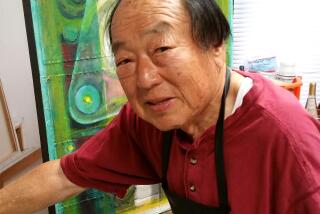FULLERTON : Japan’s Teachers of English Face Pitfalls
- Share via
One of the biggest problems in teaching English to students in Japan is that they already know too many English words, according to Shunsaku Sakata, a visiting professor at Cal State Fullerton.
About 30,000 Japanese words are borrowed from English, the 48-year-old professor said. He pointed around his office at Cal State Fullerton and spoke the words desk, chair, box, tissue and briefcase. All these words are the same in Japanese, he said.
The problem comes in that many of the words that have been added to the Japanese language have changed meaning, said Sakata, who is visiting Cal State Fullerton this year to learn how to improve English teaching in Japan. He is an instructor of English teachers at Japan’s Yokohama National University.
The word mansion, for example, has recently been used by Japanese marketers to promote Western-style apartment buildings. The result is that people call one-room studios their “mansions,” Sakata said.
In Japan, people use the word stove to describe any sort of heater--not just one used for cooking. There, to be “cunning” means to cheat on an exam.
“Most Japanese people are shocked when these words lead to a misunderstanding,” he said. Because Japanese people know that a word derives from English, they think an American person will understand them if they use it, Sakata said.
Sakata has collected about 3,000 of these troublesome words in a book called “Japanized English--True or False.” He also recorded humorous three-minute segments for a national radio station in Japan that showed the pitfalls of using “Japanized” English.
In Japan, teachers traditionally have concentrated on students’ ability to read English, not speak it, Sakata said. In the 19th Century, Japanese people wanted to learn about Western technology, and for the most part they read books and did not need to speak English.
The emphasis on written English still remains, sometimes with humorous results. “There’s a joke in our country about professors who can read Shakespeare but can’t even order a hamburger in America,” he said.
The Japanese government has recognized the problem and now hires native speakers from the United States, Australia and Britain.
But that embarrasses the Japanese teachers, Sakata said.
In addition to seeking ways to improve how English is taught in his native land, Sakata said, he hopes to teach a class on Japanese culture next spring.
More to Read
Sign up for Essential California
The most important California stories and recommendations in your inbox every morning.
You may occasionally receive promotional content from the Los Angeles Times.








